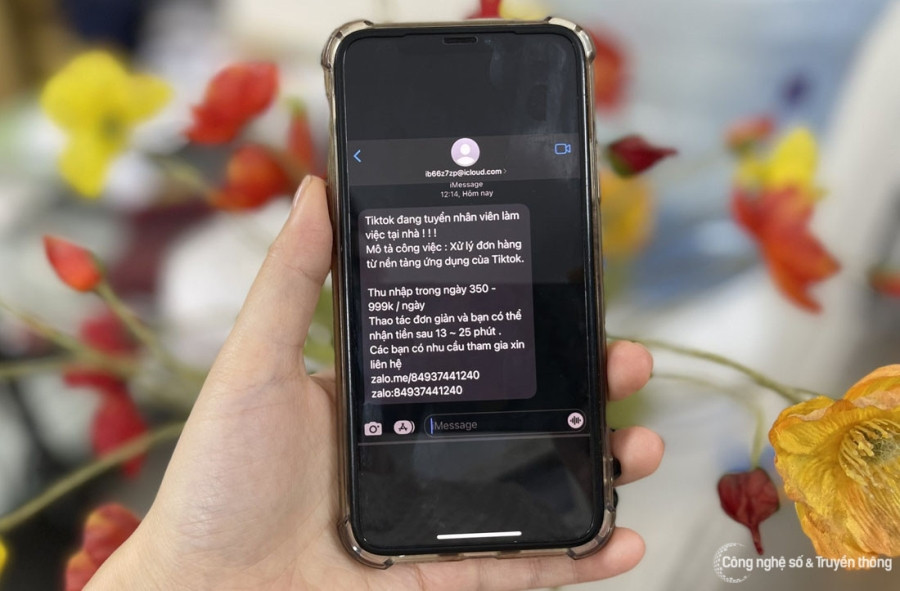The Information Security Department has just identified 3 main fraud groups with 16 forms of fraud that frequently occur in Vietnam's cyberspace, thereby helping users to recognize and avoid them.
It is estimated that Vietnam currently has more than 70 million Internet users. In the current period of promoting and accelerating digital transformation, bad actors have taken advantage of the explosion of information technology and the conveniences that information technology brings to carry out many online scams and appropriate high-value assets.
In 2022, the Vietnam Information Security Warning Portal at canhbao.khonggianmang.vn recorded more than 12,935 cases of online fraud, with two main types of fraud including fraud to steal personal information and financial fraud. Fraud to steal personal information is also a stepping stone to continue to plan a scenario to carry out financial fraud.

To carry out online scams, scammers apply many different methods to create trust, but can be divided into 3 main scam groups, which are brand counterfeiting accounting for 72.6%, online account hijacking accounting for 11.4% and the remaining 16% are other forms such as online jobs, love scams, loan apps...
“The ultimate goal of all subjects is to defraud and appropriate property; all target gullibility, lack of access to information, lack of jobs or low income, and the greed hidden deep within each person,” commented a representative of the Information Security Department.
Notably, from the actual implementation of activities to monitor and ensure the safety of Vietnam's cyberspace, with the 3 main fraud groups mentioned above, experts from the Department of Information Security also pointed out 16 forms of fraud that frequently occurred in Vietnam's cyberspace last year so that users can recognize and avoid them. These are:
Impersonating the brands of organizations such as banks, government agencies, financial companies, securities companies, etc. to send fraudulent SMS messages to victims; Impersonating official websites/blogs to create prestige to deceive victims and collect people's personal information;
Taking over social network accounts such as Zalo, Facebook, Tiktok... to send fraudulent messages to friends and relatives to take over accounts, steal information, appropriate property, defame reputation, blackmail...; Black credit applications and advertisements appear on websites, are sent widely through spam emails, SMS messages, social networks and victims will become debtors without even knowing it.

Impersonating large businesses and e-commerce sites to trick victims into becoming collaborators is a form of fraud commonly used by criminals.
Commonly used forms of fraud include: Using phone numbers impersonating authorities, police, telecommunications networks, etc. to call victims to report violations of the law and request money transfers; Using strange phone numbers to call victims, when answering the phone, the victim will have money deducted from their account without knowing;
Impersonating large businesses and e-commerce sites in Vietnam and abroad to trick victims into becoming collaborators. To lure victims, bad guys run fraudulent ads on Facebook or send spam advertising messages via SMS;
Spreading fake news that plays on curiosity, compassion and trust. To attract views, likes and then defraud and appropriate property through charity, fraudulent donations...;
Fraudulent appropriation of property through online sales promotion on Facebook, specifically selling fake goods, poor quality goods, fake airline tickets, fake promotions, virtual goods or selling fake products that do not exist;
Impersonating personal pages and user accounts on Facebook, Telegram, Zalo to create credibility and trick victims into using services or investing. For example, defrauding property by waiting on Fanpages with blue ticks, Fanpages of famous people on social networks to send private messages to victims pretending to be employees or assistants.
Love traps, taking advantage of feelings, trust and pity to commit fraud through platforms such as Facebook, Zalo, Tinder, Telegram; Fraudulently installing malware through malicious links and malware; Notifications of winning prizes, gifts, and promotions to trick victims into stealing account information and assets through fake websites;
Along with that, there is also the trick of upgrading to a 4G or 5G SIM to trick the victim's phone number to appropriate account information and assets; Impersonating emails of banks, e-wallets, reputable organizations to intimidate and defraud victims of money; Setting up a crypto virtual currency investment platform, multi-level investment, binary investment, Forex investment... to defraud and appropriate assets.
The representative of the Department of Information Security also said that recently, in order to protect people and the community from online fraud, authorities, service providers, and cyber security and safety enterprises have deployed many technical measures, propaganda activities, and raised awareness for customers and people, some of which have initially brought certain results.
However, the solutions that have been implemented have not been synchronized and unified among ministries, branches and localities. Therefore, the Department of Information Security believes that to solve online fraud, similar to real-life fraud, there needs to be coordinated and synchronous participation of functional agencies from central to local levels, in which the core is the police force responsible for preventing high-tech crimes.
According to Vietnamnet